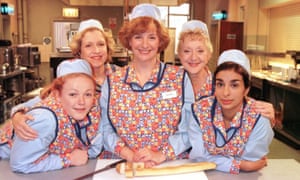
Deservedly – because she was a genuinely gifted and endearing entertainer – Victoria Wood lived ultimately in a charming and prettily situated house in Highgate, north London, of a kind that otherwise only hedge fund managers and oligarchs can afford.
The tomb of Karl Marx lies just down the hill and beyond it stretches a ruffled plain of streets and towers, where two-bedroom flats cost half a million and schoolteachers travel in from the cheaper parts of Hertfordshire. Marx believed that almost since the invention of agriculture human history could be defined by the struggle between classes, but he had less to say about the individuals who travel between them, the “upwardly mobile”, who for reasons of luck, ambition or talent have left behind the lives their parents led on the plains and are now camped somewhere on the slope that in this case had Victoria Wood at the top.
What class Wood started out in was this week a moot question. A Guardian editorial had her down as working class: “a northern, English, working-class Lancastrian and Mancunian female treasure”. But her obituary thought she was middle class: “a middle-class, sophisticated woman whom critics compared to Noel Coward and Alan Bennett”. The second seems nearer the mark. The parental home in Bury, Lancashire, had a piano; her father, an insurance salesman, wrote plays in his spare time (and later scripts for Coronation Street); and as Wood was growing up her mother went off to Manchester University as a mature student. Then again, a family with those attributes in 1953, the year Wood was born, might have thought they were getting too far above themselves (into the realm of doctors and lawyers) with the label “middle class” and stuck with “respectable working class” instead.
I was born eight years before and eight miles away in a town, Farnworth, to which my parents had moved from Scotland in 1930. We lived on an estate of prewar council houses that had streets named after flowers. Across the road, an elderly man who in my memory looks like Neville Chamberlain sometimes took his straight-backed saloon out of the garage for a good wash and polish; there were no cars otherwise, and no televisions either until the Mort family got one and invited the rest of us in to watch, from behind curtains closed against the sun, some small monochrome figures playing tennis. My father worked as a mechanic in the spinning mill across the playing fields; my mother didn’t work outside the house. They read books, attended classes run by the Workers’ Educational Association, never swore and drank no alcohol beyond my father’s occasional pale ale.
We were respectable working class. Not everyone was the same: some runny-nosed children at the top of the avenue ran around, sockless, in clogs. But mainly the people of those streets – Lily, Lupin, Daffodil, Iris – lived in a friendly, decent style that Wood’s parents would certainly have recognised and felt at home in, just as the children of those streets, now in their 70s, recognised and felt at home with their daughter’s comedy.
Of course, that world of factory hooters, wakes weeks and potato pies went long ago, and even if it hadn’t I would no longer belong to it. I was part of what Richard Hoggart in a Guardian interview called “the escalator life, where you move inexorably upwards”. Hoggart knew about escalators – born into an impoverished Leeds family in 1918, he rose through academia. But he always wrote as though he half regretted the ride, writing in The Uses of Literacy, his autobiographical study of working-class life, that the upward journey made him lonely – awkward in the social class he now found himself in as well as the class he had left. The real test of the education that had elevated the scholarship boy, Hoggart wrote, would lie in his ability by the age of 25 “to smile at his father with his whole face and to respect his flighty young sister and slower brother”.
Lynsey Hanley quotes those words in her new book, Respectable: the Experience of Class, which is serialised next week on Radio 4. When I read them, I wondered how genuinely I’d treated my own father after I had “got on”, and concluded that although I had reasons for regret – the largest is neglect, not seeing him enough – the kind of ashamedness that Hoggart seemed to be driving at wasn’t among them. But then my ascent was a modest gradient compared with Hoggart’s struggle up the north face of the class mountain. It happened later, after the welfare state had bedded in, and it happened after we moved back to Scotland, where class differences are, or were, less noticeable. The alarming aspect ofHanley’s book, given that her switch from working class to middle class is so recent, is how much more her experience has in common with Hoggart’s than it has with mine.
I don’t recognise this as my own experience, but then I more or less floated up my little gradient in the warm updraught provided by the postwar expansion of white-collar jobs and well-paid professions. People born in Britain between 1940 and 1960 had much less distance to travel in any case, because the blue-collar jobs of our parents also began to pay better. The escalator was shorter and there were many more of us on it. There was never an easier time to become something else.Hanley grew up on a big West Midlands council estate in the 1980s and 90s and is now a research fellow at Liverpool’s John Moores University. Her book is unsentimental, but to many people of my generation its main contention may seem ridiculous. “Changing class is like moving from one side of the world to the other, where you have to rescind your old passport, learn a new language and make gargantuan efforts if you are not to lose touch completely with the people and habits of your old life,” she writes, adding that while the psychological disruption can be extreme, it gets very little attention compared with the perceived benefits of social mobility, which is always seen “unequivocally [as] a Good Thing”.
That came to an end in the late 1970s, when a prolonged economic crisis and what Hanley describes as “a political hardening against working-class interests” meant that active personal ambition replaced the lazy drift of social change as the main agent of upward mobility. It was never easy to buy higher up the hill than Karl Marx, but it has since become a whole lot harder.

No hay comentarios:
Publicar un comentario